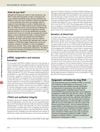 1 citations,
April 2024 in “Science Advances”
1 citations,
April 2024 in “Science Advances” Female cuckoo color differences are linked to their unique genes and help avoid male harassment.
 June 2024 in “Research Square (Research Square)”
June 2024 in “Research Square (Research Square)” Young women in West Bengal, India, with PCOS often have estrogen resistance, leptin receptor issues, folate deficiency, T2DM, and acanthosis, commonly linked to obesity.
April 2023 in “Medizinische Genetik” Male-pattern hair loss is largely influenced by genetics, with key genes identified.
 308 citations,
December 2018 in “PLOS Genetics”
308 citations,
December 2018 in “PLOS Genetics” The research found that PCOS has common genetic factors regardless of how it is diagnosed and is linked to metabolic and reproductive issues.
November 2005 in “Hair transplant forum international” Genetic differences in hair loss can help improve diagnosis and treatment.
 74 citations,
June 2013 in “Journal of Investigative Dermatology”
74 citations,
June 2013 in “Journal of Investigative Dermatology” Four genetic risk spots found for hair loss, with WNT signaling involved and a link to curly hair.
 1 citations,
November 2017 in “Expert opinion on orphan drugs”
1 citations,
November 2017 in “Expert opinion on orphan drugs” Scientists now better understand the genetics of hypohidrotic ectodermal dysplasia, leading to more accurate diagnoses and potential new treatments.
 December 2024 in “Frontiers in Veterinary Science”
December 2024 in “Frontiers in Veterinary Science” Dorper sheep's wool shedding is linked to specific genes and pathways, which may help understand human hair growth.
30 citations,
November 2019 in “Genetics selection evolution” Chinese domestic goats have unique genetic traits due to domestication and geographic isolation.
62 citations,
January 2015 in “Journal of Dermatological Science” New genetic discoveries may lead to better treatments for alopecia areata.
 October 2007 in “Journal of Investigative Dermatology”
October 2007 in “Journal of Investigative Dermatology” The meeting highlighted the genetic basis of female pattern hair loss and various skin health insights.
 15 citations,
December 2017 in “Journal of Investigative Dermatology”
15 citations,
December 2017 in “Journal of Investigative Dermatology” No strong genetic link to other skin conditions was found, but some genetic factors may make people more likely to get seborrheic dermatitis.
 September 2023 in “Nature Communications”
September 2023 in “Nature Communications” Rare genetic variants in five specific genes are linked to male-pattern hair loss but only account for a small part of the risk.
 May 2012 in “Nature Genetics”
May 2012 in “Nature Genetics” Blond hair in Solomon Islanders is due to a unique genetic variant, not European ancestry.
 24 citations,
October 2014 in “Cold Spring Harbor Perspectives in Medicine”
24 citations,
October 2014 in “Cold Spring Harbor Perspectives in Medicine” Genetic research has advanced our understanding of skin diseases, but complex conditions require an integrative approach for deeper insight.
Genetic analysis of rabbits identified key genes for traits like coat color, body size, and fertility.
 89 citations,
October 1996 in “Dermatologic Clinics”
89 citations,
October 1996 in “Dermatologic Clinics” Alopecia areata is likely caused by a combination of genetic factors and immune system dysfunction, and may represent different diseases with various causes.
18 citations,
November 2009 in “Calcified tissue international” A genetic mutation caused severe rickets and alopecia in an Indian patient, but high-dose calcium and phosphate treatment improved their condition.
 11 citations,
January 2020 in “BMC pediatrics”
11 citations,
January 2020 in “BMC pediatrics” New mutations in the SLC39A4 gene found in twins help understand the genetic cause of acrodermatitis enteropathica.
9 citations,
July 2016 in “Genes” Genetic variants in PDE6H and LPAR6 cause vision impairment and hair loss in two Pakistani brothers.
1 citations,
August 2021 in “Medical Science Monitor” Male and female hair loss have different genetic causes.
 May 2023 in “Journal of complementary medicine & alternative healthcare”
May 2023 in “Journal of complementary medicine & alternative healthcare” Ayurveda's descriptions of genetic disorders align with modern genetic understanding.
12 citations,
June 2016 in “Clinical and experimental dermatology” A new genetic mutation in the TRPV3 gene causes Olmsted-like syndrome in a Mongolian family.
 September 2022 in “Frontiers in genetics”
September 2022 in “Frontiers in genetics” A Chinese male with a new genetic mutation has a skin condition and severe urinary issues, with treatments having mixed success.
 November 2005 in “Journal of Investigative Dermatology Symposium Proceedings”
November 2005 in “Journal of Investigative Dermatology Symposium Proceedings” The 2004 hair research meeting presented new findings on hair cell differentiation, genetic factors in hair loss, hair pigmentation, and potential targeted therapies.
26 citations,
December 2013 in “Seminars in cell & developmental biology” Skin varies in thickness, color, and features due to complex genetic and cellular processes.
1 citations,
August 2023 in “Biomolecules” Certain immune-related proteins are higher in people with alopecia and their healthy relatives, hinting at a genetic link.
 99 citations,
July 2017 in “Clinical Reviews in Allergy & Immunology”
99 citations,
July 2017 in “Clinical Reviews in Allergy & Immunology” New treatments for Alopecia Areata show promise but need to be more effective and affordable.
 9 citations,
January 2015 in “Current problems in dermatology”
9 citations,
January 2015 in “Current problems in dermatology” Scientists have found specific genes linked to different hair loss conditions, which could lead to new treatments.
189 citations,
July 2009 in “The Journal of clinical investigation/The journal of clinical investigation” Epidermolysis bullosa simplex causes easily blistered skin due to faulty skin cell proteins, leading to new treatment ideas.


















